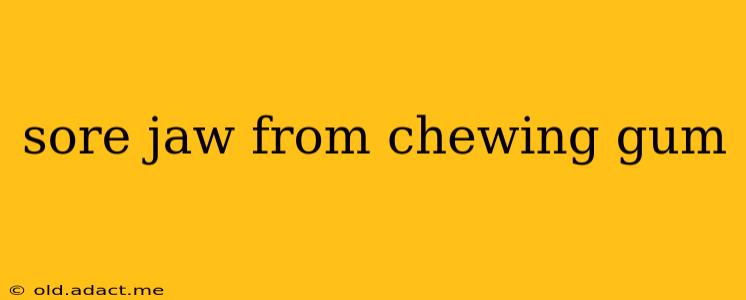Chewing gum, a seemingly innocuous habit, can surprisingly lead to a sore jaw. This discomfort, ranging from mild aching to significant pain, can disrupt daily life. Understanding the causes, prevention strategies, and treatment options is crucial for managing this common issue. This article delves into the reasons behind jaw pain from gum chewing, offering practical advice to alleviate and prevent future discomfort.
What Causes Jaw Pain from Chewing Gum?
The primary culprit behind gum-induced jaw pain is overuse and strain of the temporomandibular joint (TMJ). This joint connects your jawbone to your skull, enabling essential functions like chewing, talking, and yawning. Excessive chewing, especially with forceful or prolonged gum chewing, can overwork the TMJ muscles, leading to inflammation, pain, and stiffness.
Certain types of gum can exacerbate the issue. Gums that require more intense chewing, those with a firmer texture, or those containing additives that may irritate the jaw muscles, may contribute to increased discomfort.
Beyond the TMJ, other factors can contribute to jaw pain when chewing gum:
- Bruxism (teeth grinding): Unconscious teeth grinding, often worsened by stress, can significantly strain the jaw muscles, particularly when combined with gum chewing.
- Improper bite: A misaligned bite or other dental problems can increase the strain on the TMJ during chewing, making gum chewing more likely to cause pain.
- Existing TMJ disorders: Individuals already suffering from TMJ disorders (temporomandibular joint dysfunction) are more susceptible to jaw pain from chewing gum, as the added strain worsens pre-existing conditions.
- Postural issues: Poor posture can affect the alignment of the jaw, contributing to TMJ stress and pain.
How Can I Prevent Sore Jaws from Chewing Gum?
Preventing sore jaws requires a mindful approach to gum chewing habits:
- Chew less frequently: Reduce the amount of gum you chew daily. Take breaks between chewing sessions.
- Chew gently: Avoid forceful chewing. Consciously try to chew with a lighter touch.
- Choose softer gums: Opt for softer, easier-to-chew gums to minimize strain on the jaw.
- Limit chewing duration: Set a time limit for each chewing session, such as 10-15 minutes.
- Be mindful of stress: Manage stress levels through relaxation techniques like deep breathing, yoga, or meditation. Stress often exacerbates bruxism.
- Maintain good posture: Practice good posture while sitting and standing. This helps to maintain proper jaw alignment.
Does Chewing Gum Cause TMJ?
While chewing gum doesn't directly cause TMJ disorders, it can certainly exacerbate existing conditions or contribute to the development of TMJ problems in individuals already predisposed. Overuse of the jaw muscles through excessive or forceful gum chewing puts added stress on the TMJ, increasing the risk of pain and dysfunction. If you have pre-existing TMJ issues, it's best to avoid or significantly limit gum chewing.
How Long Does Jaw Pain from Chewing Gum Last?
The duration of jaw pain from chewing gum varies depending on the severity of the strain and individual factors. Mild discomfort may resolve within a day or two with rest. More significant pain may persist for several days or even weeks, requiring additional interventions. If the pain is persistent or severe, it's crucial to consult a dentist or doctor.
What Can I Do to Treat a Sore Jaw from Chewing Gum?
Treatment for a sore jaw from chewing gum focuses on reducing inflammation and pain. Home remedies can often provide relief:
- Rest your jaw: Avoid chewing, talking excessively, and yawning widely.
- Apply ice or heat: Alternating ice and heat packs can help reduce inflammation and pain.
- Over-the-counter pain relievers: Ibuprofen or acetaminophen can help manage pain and inflammation.
- Gentle jaw stretches and exercises: Consult a physical therapist or dentist for specific exercises to strengthen and relax jaw muscles.
When Should I See a Doctor or Dentist?
Seek professional help if:
- Your jaw pain is severe or persistent.
- You experience jaw clicking or locking.
- Your pain is accompanied by headaches or earaches.
- You experience numbness or tingling in your jaw.
- Home remedies provide no relief.
A dentist or doctor can properly diagnose the cause of your jaw pain and recommend appropriate treatment, which may include physical therapy, bite guards, or other interventions. Early intervention is crucial to prevent chronic TMJ issues.
This article provides general information and should not be considered medical advice. Always consult with a healthcare professional for diagnosis and treatment of any medical condition.
